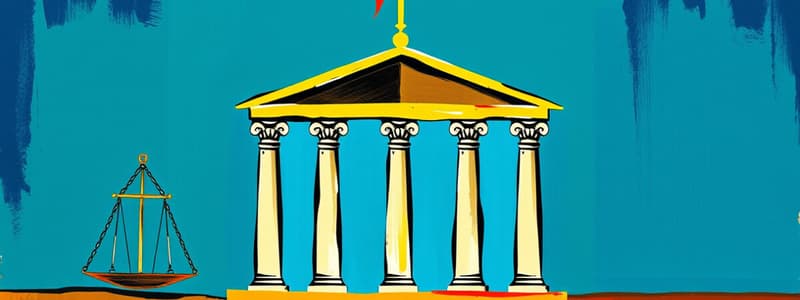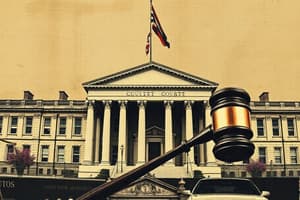Podcast
Questions and Answers
Which of the following best describes civil courts?
Which of the following best describes civil courts?
- They deal with offenses against public safety.
- They handle disputes between individuals or organizations. (correct)
- They serve as the highest court in the judicial system.
- They are focused on criminal cases like theft and murder.
What does judicial review allow courts to do?
What does judicial review allow courts to do?
- Conduct trials for criminal offenses
- Set new precedents for future cases
- Review evidence for new cases
- Examine the constitutionality of legislative acts (correct)
What is the primary function of appellate courts?
What is the primary function of appellate courts?
- To establish new laws
- To hear cases of constitutional law
- To conduct trials and hear new evidence
- To review decisions made by trial courts (correct)
Which term describes the authority of a court to hear a specific case?
Which term describes the authority of a court to hear a specific case?
What is the role of judges in the judicial system?
What is the role of judges in the judicial system?
Which of the following rights are guaranteed within the judicial system?
Which of the following rights are guaranteed within the judicial system?
In the judicial process, what occurs during the trial phase?
In the judicial process, what occurs during the trial phase?
What best defines common law?
What best defines common law?
Flashcards are hidden until you start studying
Study Notes
Judicial System in Civics
Overview
- The judicial system is a key component of government, responsible for interpreting laws, resolving disputes, and protecting rights.
Structure of the Judicial System
-
Levels of Courts
- Trial Courts: Where cases begin; evidence and testimonies are presented.
- Appellate Courts: Review decisions made by trial courts; no new evidence is introduced.
- Supreme Court: The highest court; primarily hears significant cases or appeals.
-
Types of Courts
- Civil Courts: Handle disputes between individuals or organizations (e.g., contracts, property).
- Criminal Courts: Deal with offenses against the state or public (e.g., theft, murder).
Key Functions
- Interpretation of Laws: Judges explain the meaning and application of laws.
- Dispute Resolution: Courts provide a formal mechanism to resolve conflicts.
- Protection of Rights: Safeguard individual rights against government actions and ensure justice.
Judicial Process
- Filing a Case: Initiated by a plaintiff (civil) or prosecutor (criminal).
- Pre-Trial Procedures: Includes discovery, motions, and trial preparations.
- Trial: Presentation of evidence, witness testimonies, and legal arguments.
- Verdict and Sentencing: Decision made by a judge or jury; penalties imposed if applicable.
- Appeal Process: Parties may appeal to higher courts if they believe a legal error was made.
Concepts of Law
- Common Law: Law developed by judges through decisions and precedents, rather than through statutes.
- Statutory Law: Written laws passed by legislative bodies.
- Constitutional Law: Laws that govern the interpretation of the Constitution.
Judicial Review
- The power of courts to examine the constitutionality of legislative acts and executive actions.
Judicial Independence
- Principle that the judiciary should be independent from the other branches of government to ensure fairness and impartiality.
Rights within the Judicial System
- Right to a fair trial
- Right to legal representation
- Right to remain silent (in criminal cases)
Important Legal Terms
- Jurisdiction: The authority of a court to hear a case.
- Precedent: A previous case or legal decision that serves as an example for future cases.
- Litigation: The process of taking legal action in court.
Current Issues and Trends
- Access to justice and legal representation for underprivileged groups.
- Impact of technology on the judicial process (e.g., virtual trials).
- Ongoing discussions around judicial reform and accountability.
Overview
- The judicial system interprets laws, resolves disputes, and protects individual rights.
Structure of the Judicial System
-
Levels of Courts:
- Trial Courts: Initial court for cases, presenting evidence and testimonies.
- Appellate Courts: Reviews trial court decisions without new evidence.
- Supreme Court: The highest court, focusing on significant cases and appeals.
-
Types of Courts:
- Civil Courts: Address disputes between individuals or entities, such as contractual or property issues.
- Criminal Courts: Handle offenses against society, including theft and murder.
Key Functions
- Interpretation of Laws: Judges clarify the application and meaning of laws.
- Dispute Resolution: Courts provide official channels for conflict resolution.
- Protection of Rights: Ensure individual rights are defended against government actions.
Judicial Process
- Filing a Case: Initiated by a plaintiff in civil cases or a prosecutor in criminal cases.
- Pre-Trial Procedures: Involve discovery, legal motions, and preparations for trial.
- Trial: Evidence is presented, along with witness testimonies and legal arguments.
- Verdict and Sentencing: Decision from a judge or jury, with possible penalties.
- Appeal Process: Parties can challenge decisions in higher courts upon belief of legal error.
Concepts of Law
- Common Law: Developed through judicial decisions and legal precedents.
- Statutory Law: Established by legislative bodies as written laws.
- Constitutional Law: Governs the interpretation and application of the Constitution.
Judicial Review
- Courts' authority to evaluate the constitutionality of legislative actions and executive procedures.
Judicial Independence
- Ensures judiciary remains impartial and independent from other government branches for fair justice.
Rights within the Judicial System
- Right to a Fair Trial: Guarantees unbiased legal proceedings.
- Right to Legal Representation: Access to a lawyer for defense.
- Right to Remain Silent: Protects against self-incrimination in criminal cases.
Important Legal Terms
- Jurisdiction: Court's authority to hear specific cases.
- Precedent: Prior legal cases guiding future ones.
- Litigation: The process of engaging in legal proceedings.
Current Issues and Trends
- Focus on improving access to justice for disadvantaged groups.
- Technology's influence on judicial processes, including virtual trials.
- Ongoing debates surrounding judicial reforms and accountability measures.
Studying That Suits You
Use AI to generate personalized quizzes and flashcards to suit your learning preferences.



